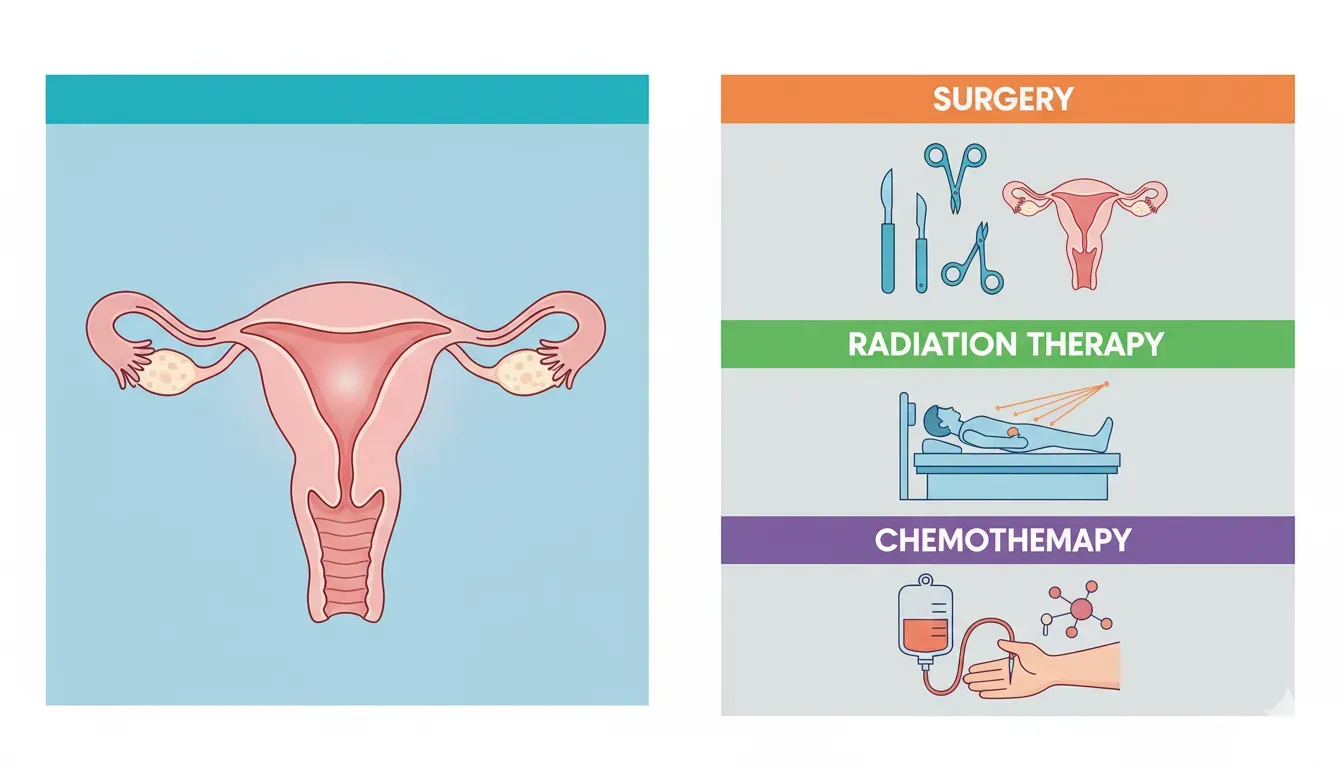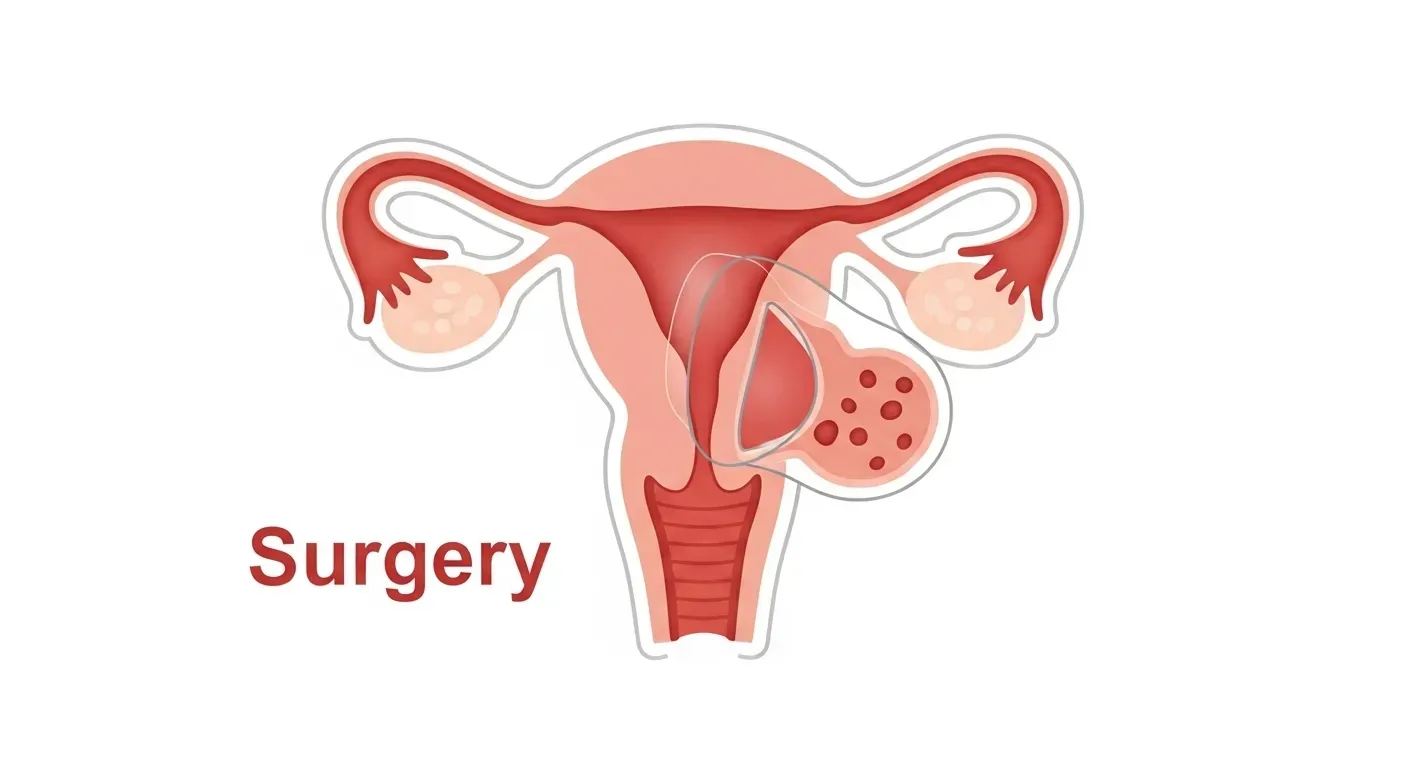TREATMENTS
Endometrial Cancer: Treatment, Side Effects, and Recovery
Endometrial cancer, also known as uterine cancer, is a condition that can affect a woman's reproductive system. It is important to fully understand the treatment options, potential side effects, and long-term care needed to manage the disease. The approach to treatment is individualized, and it is critical to discuss all aspects of care with your medical team. Here's a detailed look at the various elements of managing endometrial cancer.
Request Consultation or Second Opinion

Understanding Treatment Options
The main treatment for endometrial cancer is surgery, which typically involves removing the uterus. However, depending on the type, stage, and grade of cancer, other treatments may be recommended. These could include radiation therapy, chemotherapy, hormone therapy, and targeted therapy. Each of these treatments has different functions and may be used alone or in combination, depending on the specific case.
Your healthcare provider will take various factors into consideration when recommending a treatment plan. These factors include the type of cancer, how advanced it is, your age, general health, and personal preferences. It’s also common for doctors to consult a multidisciplinary team of specialists to determine the best approach for each patient.
In cases where fertility preservation is a concern, particularly for younger women with early-stage, low-risk cancer, fertility-sparing options like hormone therapy may be considered. This allows patients to preserve their uterus and delay surgery, though this approach is suitable only for select cases.
For women whose cancer has spread, the treatment plan becomes more complex. Advanced or recurrent endometrial cancer may require chemotherapy, radiation, or immunotherapy, depending on where the cancer has spread in the body. These treatments aim to control or shrink the tumor and manage symptoms.
DOWNLOAD A FREE Roadmap
FREE Endometriosis Symptom & Diary Kit
Keep track of your daily symptoms, pain levels, and treatment responses with our expert-designed PDF. This tool helps both you and your care team identify patterns and optimize your plan.
Managing Side Effects
While the primary goal of treatment is to eliminate cancer, it’s also important to manage the side effects that often come with it. Many women experience common side effects such as fatigue, hot flashes, hair loss, vaginal dryness, and gastrointestinal or urinary issues. These symptoms can be managed with medications or lifestyle adjustments, and it’s essential to keep an open line of communication with your medical team to ensure these issues are addressed promptly.
Pelvic radiotherapy, often used to treat endometrial cancer, can also affect sexual health. Common issues include vaginal dryness and pain during intercourse. Patients are encouraged to use vaginal dilators and lubricants to alleviate these symptoms. It’s important to discuss any concerns about sexual health with your doctor, who can provide guidance and potential solutions.

Managing Side Effects
While the primary goal of treatment is to eliminate cancer, it’s also important to manage the side effects that often come with it. Many women experience common side effects such as fatigue, hot flashes, hair loss, vaginal dryness, and gastrointestinal or urinary issues.
These symptoms can be managed with medications or lifestyle adjustments, and it’s essential to keep an open line of communication with your medical team to ensure these issues are addressed promptly.
Pelvic radiotherapy, often used to treat endometrial cancer, can also affect sexual health. Common issues include vaginal dryness and pain during intercourse. Patients are encouraged to use vaginal dilators and lubricants to alleviate these symptoms. It’s important to discuss any concerns about sexual health with your doctor, who can provide guidance and potential solutions.
Recovery and Follow-Up Care
Following treatment, regular follow-up visits are essential to monitor for any signs of recurrence. These visits typically include exams and imaging tests. Your healthcare provider will guide you on what symptoms to watch for and when to seek medical attention if they occur.
As you recover, your healthcare team will offer recommendations for resuming normal activities such as exercise and work. The timeline for this varies from person to person, depending on how well you’re recovering and the specifics of your treatment.
Other Important Considerations
It’s not uncommon for patients to seek a second opinion, particularly when deciding on a treatment plan. Studies have shown that women who are treated by specialists in gynecologic oncology tend to experience better outcomes. If you're uncertain about your treatment options, seeking a second opinion from an experienced gynecologic oncologist may be beneficial.
Finding a specialist who is highly experienced in treating endometrial cancer is a priority for many patients. Your primary care physician or oncologist can help guide you toward the right specialist, ensuring you receive the best possible care.

Why choose Dr. Minig & our team
More than a clinic — we are your international partner in healing.
With over 20 years experience treating global patients, we offer personalized surgical care and full logistical support for those traveling to Valencia.
- Specialized Expertise: Dr. Minig is a gynecologic oncologist with advanced training in complex endometriosis.
- Minimally Invasive Excellence: Over 95% of our surgeries utilize laparoscopic or robotic techniques.
- Individualized Care: We align treatment with your pain tolerance, fertility desires, and lifestyle.
- Whole-Woman Approach: From surgery to nutrition and emotional well-being, we support every facet of your health.
- Industry-Leading Research & Innovation
“Dr. Minig’s expertise let me restart my workouts just two months after surgery—without fear of a bulge returning.”
— Marta S., Valencia

Frequently asked questions
What are my treatment options?
Surgery is the main treatment for most women, but other options like radiation therapy, chemotherapy, hormone therapy, and targeted therapy may also be used.
Which treatment is right for me?
The recommended plan depends on the cancer's stage, type, and grade of tumor. Your overall health, age, and personal preferences are also considered. Multidisciplinary medical tumor board is essential to decide the best strategy for each patient.
What if I want to have children?
In a very select group of patients with early-stage, low-risk endometrial cancer, fertility-sparing hormone therapy may be an option, allowing them to delay surgery. In these cases, it is feasible to treat the tumor while preserving the uterus.
What if the cancer has spread?
For advanced or recurrent endometrial cancer, treatment options depend on where the cancer has spread and can include a combination of chemotherapy, radiation, and immunotherapy.
What side effects should I expect?
Common side effects of various treatments can include fatigue, hot flashes, vaginal dryness, hair loss, and urinary or gastrointestinal issues.
How can I manage side effects?
Your medical team can prescribe medications and suggest lifestyle changes to help manage symptoms. It is important to discuss these issues openly.
How will treatment affect my sexual health?
The most common treatment associated with alteration of sexual health is pelvic radiotherapy. Patients frequently ask about managing vaginal dryness, pain, or other issues and may benefit from using vaginal dilators or lubricants.
What is the follow-up schedule?
After treatment, you will need regular follow-up visits, exams, and imaging to monitor for any signs of recurrence.
What symptoms should I watch for?
You will need to be aware of symptoms that could indicate the cancer has returned and know who to contact if they occur.
When can I return to normal activities?
Your healthcare team will advise you on the timeline for resuming your usual activities, including exercise and work.
Should I get a second opinion?
Patients may ask about seeking a second opinion, especially regarding the recommended treatment plan.
Scientific studies have demonstrated that when women with endometrial cancer receive care by a well-trained gynecological oncologist, leave longer period.
How can I find a specialist?
Patients often ask how to find a gynecologic oncologist or other specialists with extensive experience in treating endometrial cancer.
Ready for Relief? Let’s talk.
Whether you want our symptom kit, the patient guide, or to speak directly with Dr. Minig, we’re here for you.
Learn what it’s like to travel for expert endometriosis care in Valencia.
Hear from real patients who came to Valencia for expert care.
Watch “My Valencia surgery experience”
